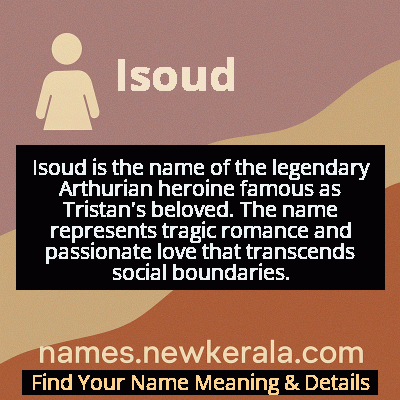Isoud Name Meaning & Details
Origin, Popularity, Numerology Analysis & Name Meaning of Isoud
Discover the origin, meaning, and cultural significance of the name ISOUD. Delve into its historical roots and explore the lasting impact it has had on communities and traditions.
Name
Isoud
Gender
Female
Origin
Arthurian
Lucky Number
5
Meaning of the Name - Isoud
Isoud is the name of the legendary Arthurian heroine famous as Tristan's beloved. The name represents tragic romance and passionate love that transcends social boundaries.
Isoud - Complete Numerology Analysis
Your Numerology Number
Based on Pythagorean Numerology System
Ruling Planet
Mercury
Positive Nature
Adventurous, dynamic, curious, and social.
Negative Traits
Restless, impatient, inconsistent, prone to indulgence.
Lucky Colours
Green, white.
Lucky Days
Wednesday.
Lucky Stones
Emerald.
Harmony Numbers
1, 3, 9.
Best Suited Professions
Sales, marketing, travel, entertainment.
What People Like About You
Versatility, charisma, adventurous spirit.
Famous People Named Isoud
Isoud of Ireland
Legendary Queen
Central figure in Tristan and Isolde romance, known for her tragic love story and healing abilities
Isoud la Blanche Mains
Literary Character
Second Isolde in Tristan legend, representing the complications of love and marriage
Isolde (Opera Character)
Operatic Heroine
Wagner's iconic portrayal in Tristan und Isolde, defining romantic tragedy in opera
Name Variations & International Equivalents
Click on blue names to explore their detailed meanings. Gray names with will be available soon.
Cultural & Historical Significance
The character's cultural impact extends beyond medieval literature into modern interpretations across various media. Isoud's dilemma between her duty as a queen married to King Mark and her passionate love for Tristan has been analyzed as a metaphor for the conflict between societal expectations and individual happiness. Her story has been adapted in countless forms, from Wagner's revolutionary opera to contemporary novels and films, maintaining relevance through its exploration of universal human emotions.
Extended Personality Analysis
Isoud is typically characterized by intense emotional depth, unwavering loyalty to her true love, and remarkable intelligence. She demonstrates considerable medical knowledge as a healer in the legends, showing both practical skills and compassionate nature. Her character exhibits strength in adversity, navigating complex political situations while maintaining her personal integrity, though often at great personal cost.
Despite her tragic circumstances, Isoud displays resilience and strategic thinking. She is portrayed as both vulnerable and strong—capable of deep passion yet bound by her royal duties. Her personality embodies the romantic ideal of love transcending social boundaries, while also reflecting the medieval concept of courtly love where passion and suffering are intertwined. The character's complexity makes her both a romantic ideal and a psychologically realistic portrayal of a woman caught between love and duty.
Modern Usage & Popularity
The name Isoud remains relatively rare in modern times, primarily used by parents seeking unique Arthurian or literary names. While the more common variant 'Isolde' sees occasional usage, particularly in European countries, Isoud itself is quite uncommon. The name appeals to those interested in medieval literature, Celtic mythology, or seeking a name with romantic and tragic connotations. Its usage peaked briefly during the Victorian medieval revival and sees occasional resurgences following popular adaptations of the Tristan and Isolde story. Contemporary usage is mostly limited to literary enthusiasts and those wanting a distinctive name with deep cultural roots.
Symbolic & Spiritual Meanings
Isoud symbolizes the eternal conflict between passionate love and social duty, representing the idea that true love often exists outside conventional boundaries. She embodies the concept of tragic romance—the notion that the most profound love stories are often those that cannot be fully realized. The character also represents healing and transformation, as her medical knowledge and the love potion that binds her to Tristan suggest the power of love to both heal and destroy. Isoud serves as a metaphor for the human condition where desire and obligation create impossible choices, making her story perpetually relevant across cultures and centuries.

